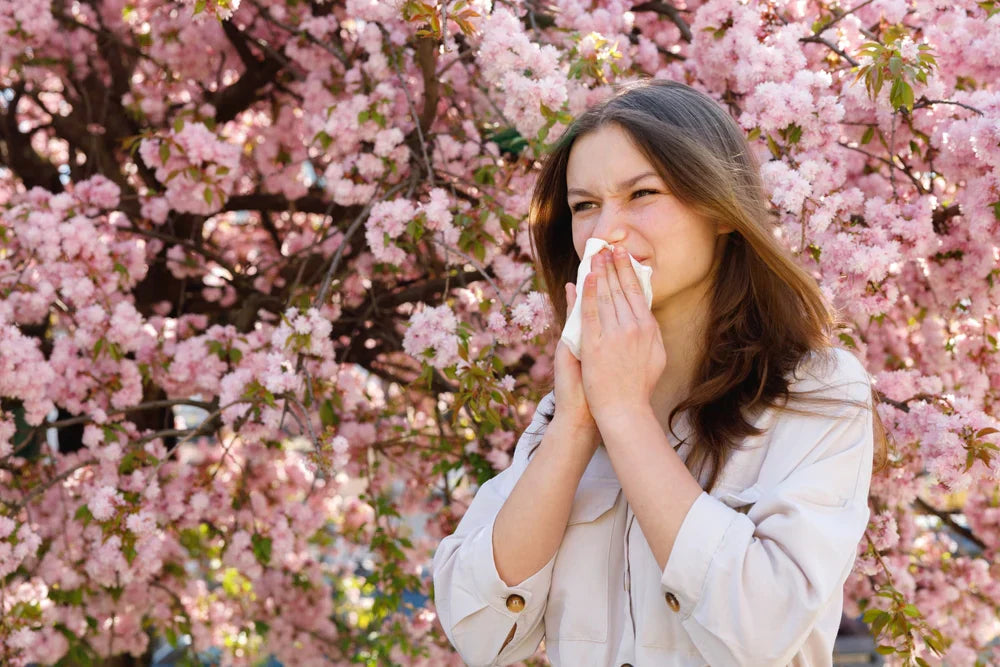For many people, spring means allergy season. This is the time of year when grass, tree, and weed pollen counts are high, resulting in allergic rhinitis (hay fever). These seasonal allergies cause irritating symptoms that may include sneezing, watery eyes, nasal congestion, itchy throat, sinus pressure, and others. For some, allergies can even lead to asthma. Thankfully, there are some things you can do so you don’t have to suffer all season long. Follow these tips to prevent and treat your seasonal allergies so you can find much-needed relief.
1. Limit Exposure to Allergy Triggers
One of the best ways to combat seasonal allergies is to limit your exposure to your allergy triggers. Most people with spring allergies are allergic to certain types of pollen, so keep an eye on pollen forecasts in local weather reports. When pollen counts are high, try to stay indoors to avoid exposure. Pollen counts tend to be highest on dry, windy days. The best time to go outside is after a heavy rain, which helps clear pollen from the air. Wearing a face mask while you do outdoor chores can also help limit the amount of pollen you breathe in. After you spend time outdoors, make sure you remove your clothes and shoes and take a shower to rinse pollen from your hair and skin to minimize exposure.
2. Keep Your Indoor Air Clean

While it’s impossible to eliminate all allergens from the air in your home, there are some things you can do to keep your indoor air as clean as possible to help reduce seasonal allergies. Use air conditioning instead of opening your windows and doors to keep allergens from entering your home. Install high-efficiency air filters on your air conditioner and air purifier to filter allergens out of the air, and replace them regularly. Clean your floors, furniture, and bedding frequently to minimize the amount of allergens sitting on surfaces in your home. If you are allergic to mold, mildew, or dust mites, using a dehumidifier can help reduce the amount of these allergens indoors.
3. Rinse Your Sinuses
Using a saline solution to rinse your sinuses can be an effective and inexpensive way to prevent seasonal allergies and relieve symptoms. You can use a nasal irrigation kit like a neti pot or nasal bulb to flush out allergens and mucus from your nasal passages. A sinus rinse removes allergens from your nose before they have a chance to cause irritation, and it also rinses out mucus to relieve congestion. To make a saline solution at home, use a cup of warm, sterile water mixed with half a teaspoon of salt and a pinch of baking soda. Make sure you rinse the nasal irrigation device after each use with clean water, then leave it open to air dry.
4. Try Over-the-Counter Allergy Medications

There are a number of over-the-counter allergy medications available to treat seasonal allergies. Oral antihistamines can help relieve symptoms such as sneezing, itching, runny or stuffy nose, and watery eyes. Popular antihistamines include Zyrtec, Allegra, Claritin, and Benadryl. Nasal steroid sprays are considered effective allergy treatments as well. Examples include Flonase, Nasacort, Rhinocort, and Nasonex. These sprays are most effective for long-term allergy relief. For temporary relief from nasal congestion, you can use decongestants like Sudafed, Neo-Synephrine, and Afrin. Some allergy medications combine antihistamines and decongestants for additional relief, such as Claritin-D, Allegra-D, and Zyrtec-D. It’s important to note, however, that decongestants are not recommended for long-term use and may actually make congestion worse if taken for more than a few days.
5. Take Supplements
There’s evidence to support that certain dietary supplements can help with seasonal allergies. For example, vitamin C acts as a natural antihistamine and can help reduce allergy symptoms after exposure as well as support healthy immune function. Quercetin is a flavonoid that has immune-supporting properties, helps support a healthy inflammatory response, and regulates histamine release, all of which can be beneficial for fighting allergies. Aller-Essentials is a supplement that contains a blend of allergy-fighting nutrients, including vitamin C, quercetin, hesperidin, EpiCor, and others. This formula supports healthy immune and nasal function and helps stabilize mast cells to control histamine release.
Do you have questions about treating seasonal allergies? Our knowledgeable pharmacy team at Hickory Drugs is happy to answer your questions and provide recommendations on allergy medications, supplements, and treatments. Don’t hesitate to reach out to us today so we can help you get back to feeling your best!

